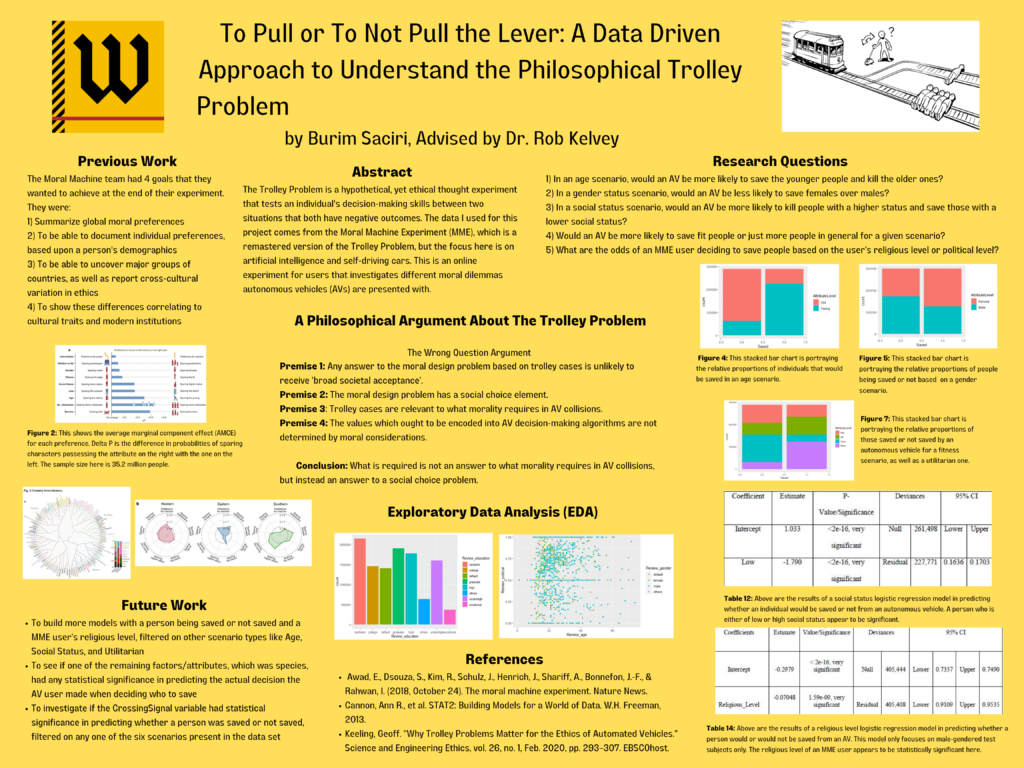
To Pull or To Not Pull the Lever: A Data Driven Approach to Understand the Philosophical Trolley Problem

Name: Burim Saciri
Major: Statistical & Data Science
Minor: Philosophy
Advisor: Dr. Rob Kelvey; Dr. Jillian Morrison (Second Reader)
For my Independent Study project, I will be using real data to answer questions about the famous philosophical Trolley Problem. The Trolley Problem is a classic problem in the field of philosophy involving ethics and utilitarianism. One version of the problem is this: you have a runaway set of tracks, and you are responsible for either pulling a lever which would cause a train to run over 5 people tied down to a set of tracks or you could not pull the lever, resulting in the train traveling straight ahead and only killing one person tied down to the tracks. The data I will be using for this project comes from The Moral Machine Experiment (MME), which is a remastered version of the Trolley Problem, but now the focus is on self-driving cars and artificial intelligence. It is an online experiment for users that investigates different moral dilemmas autonomous vehicles (AVs) are presented with. In this experiment, users are presented with two scenarios that would result in them either swerving their car or keeping it on its course, and they are to choose which one they would most prefer. The Moral Machine Experiment focuses on eight, main factors: sparing the young or the elderly, humans or pets, passengers or pedestrians, men or women, higher or lower status, more or less fit, more lives or fewer lives, and crossing legally or illegally. What interests me about my project was how I was able to infuse my philosophical skills I have learned from my minor into my Senior IS paper. What excites me about my project is the fact that I was able to work with real-world data from an actual experiment to address questions I was most curious about trying to answer. Next steps I could see for this research are someone building more models with a person being saved or not with a MME user’s religious level, filtered on other scenario types I did not investigate like, age, social status, and utilitarian to further verify that this variable religious level still has a noticeable effect, like the MME team claimed in their paper.

Posted in Comments Enabled, Independent Study, Symposium 2022 on April 26, 2022.
11 responses to “To Pull or To Not Pull the Lever: A Data Driven Approach to Understand the Philosophical Trolley Problem”
Related Posts
Related Areas of Study
Statistical & Data Sciences
Use statistics, math, and computer science to gain insights into data and solve real-world problems.
Major MinorPhilosophy
Delve into ethical and moral debates while critically analyzing the issues facing humanity
Major Minor


Hello, Burim. Can you give us insight as to why you decided to choose this as your topic? What is something you learned that really surprised you? Thanks for your time. Congratulations on the completion of this project.
Burim! Congratulations on your IS. What an incredible take on this topic! I remember working with you in your FYS and in the writing center. Im really happy to see how far you have come. Best of luck in what is next for you Burim! Again, amazing work this is incredible!
Very interesting Topic! I am glad you were able to explore this dilemma because it is really a huge test in ethics!
This topic is very interesting! I enjoy how you made the topic easy to interpret for individuals not as educated in philosphy and how engaging your poster is.
Hello Besnik!
Thank you and good questions. The reason why I decided to choose this as my topic was because I wanted to find some way of incorporating my minor in Philosophy into my Senior IS project, and what better way to do this then to find a real, philosophical-based data set.
Something I learned that really surprised me was when I performed Exploratory Data Analysis, I was curious to see the top ten countries in the world with the most Moral Machine Experiment (MME) users, and number one came out to be the United States with over 2.4 million users, followed by Brazil with 1.3 million userS, and the countries of China and India with enormous population levels did not even make it into this top 10 list of most MME users.
Mylo!
Thank you so much, it really means a lot. I remember that too! It feels like I just saw you the other day and then BAM, here I am, about to graduate from The College of Wooster. I hope that your post-grad life after Wooster has been going well for you!
Thank you Dr. Morrison! I wanted to make sure that the topic I picked for my Senior IS would be something interesting enough for me to continually work on.
Thanks Gennete! My IS advisor suggested that I include a philosophical argument or two behind the Trolley Problem in case someone were to walk by my poster at IS Symposium that was a Philosophy major.
Burim
Congratulations 😊What was the hardest part to find information on and what was the easiest explain both questions please.
Thanks mom! I would say the hardest part to find information on would be the philosophical arguments behind the Trolley Problem, because it required me to do some deeper research into relevant, yet reliable sources. The easiest part to find information on would be my sources discussing artificial intelligence (AI) and autonomous vehicles (AVs), because I believe that it is such a popular topic that is still being discussed in today’s world of technology and innovation.
… [Trackback]
[…] Read More here: wooster.edu/2022/04/26/burim-saciri/ […]